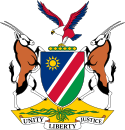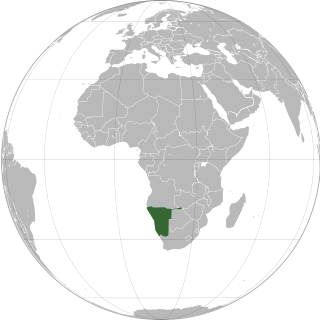 |
|---|
Parliamentary elections were held for the first time in the territory of South West Africa on 26 May 1926. [1] The German League in South West Africa won eight of the twelve elected seats in the Whites-only election. [2]
 |
|---|
Parliamentary elections were held for the first time in the territory of South West Africa on 26 May 1926. [1] The German League in South West Africa won eight of the twelve elected seats in the Whites-only election. [2]
The Legislative Assembly had 18 seats, of which twelve were elected in single-member constituencies, and six were appointed by the territory's Administrator, Albertus Johannes Werth. The twelve constituencies were Gibeon, Gobabis, Grootfontein, Keetmanshoop, Kolmanskop, Luderitz, Okahandja, Omaruru, Swakopmund, Warmbad, Windhoek Central and Windhoek District. [2]
German League candidates were returned unopposed in six of the twelve constituencies; Grootfontein, Keetmanshoop, Kolmanskop, Luderitz, Swakopmund and Windhoek. [2] Of the six members appointed by Werth, two were from the German League and four from the National Party. [2]
| Party | Votes | % | Seats | |
|---|---|---|---|---|
| National Party of South West Africa | 612 | 26.12 | 2 | |
| South West Party | 555 | 23.69 | 1 | |
| German League in South West Africa | 498 | 21.25 | 8 | |
| Independents | 678 | 28.94 | 1 | |
| Appointed members | 0 | 0.00 | 6 | |
| Total | 2,343 | 100.00 | 18 | |
| Source: Ngavirue | ||||

Lüderitz is a town in the ǁKaras Region of southern Namibia. It lies on one of the least hospitable coasts in Africa. It is a port developed around Robert Harbour and Shark Island.

The ǁKharas Region is the southernmost, largest, and least densely populated of the 14 regions of Namibia; its capital is Keetmanshoop. The name assigned to the region reflects the prominence of the Karas mountain range in its southern part. The ǁKharas region contains the municipality of Keetmanshoop, the towns Karasburg, Lüderitz and Oranjemund, and the self-governed villages Aroab, Berseba, Bethanie, Koës and Tses.
The following lists events that happened during 1922 in South Africa.

The United National South West Party was a political party in South West Africa, the local counterpart of the South African United Party but founded eight years earlier and merged into the latter in 1971. It was formed through a merger of National Party of South West Africa and the South West Party, in order to counter the influence of the German League in South West Africa. The first congress of UNSWP was held in Windhoek on 1–2 April 1927.

TransNamib Holdings Limited, commonly referred to as TransNamib, is a state-owned railway company in Namibia. Organised as a holding company, it provides both rail and road freight services, as well as passenger rail services. Its headquarters are in the country’s capital Windhoek.
Articles related to Namibia include:

Vehicle registration plates of Namibia are yellow fluorescent metal plates with imprints in black. The standard version is uniform throughout the country, and carries one of the following forms:

Namibia's telephone numbering plan was originally devised when the country, then known as South West Africa, was under South African administration, and integrated into the South African telephone numbering plan.

Wilhelm Sander was a master architect and contractor working for Sander & Kock known for his work in German South West Africa, today's Namibia.

Parliamentary elections were held in South West Africa on 3 July 1929. The whites-only election saw a victory for the United National South West Party, which won seven of the twelve elected seats in the Legislative Assembly.

Parliamentary elections were held in South West Africa on 31 October 1934. The whites-only election saw a victory for the United National South West Party, which won eight of the twelve elected seats in the Legislative Assembly.

Parliamentary elections were held in South West Africa on 21 February 1940. The whites-only election saw a victory for the United National South West Party, which won 10 of the 12 elected seats in the Legislative Assembly.

Parliamentary elections were held in South West Africa on 30 August 1950. The whites-only election saw a victory for the National Party of South West Africa, which won 15 of the 18 seats in the Legislative Assembly.

Parliamentary elections were held in South West Africa on 19 May 1945. The whites-only election saw a victory for the United National South West Party, which won all 12 elected seats in the Legislative Assembly.

Parliamentary elections were held in South West Africa on 16 November 1955. The whites-only election saw a victory for the National Party of South West Africa, which won 16 of the 18 seats in the Legislative Assembly.

The rail service in Namibia is provided by TransNamib. The Namibian rail network consists of 2,687 km of tracks (2017).

Namibia is a multilingual country in which German is recognised as a national language. While English has been the sole official language of the country since 1990, in many areas of the country, German enjoys official status at a community level. A national variety of German is also known as Namdeutsch.

Parliamentary elections were held in South West Africa on 15 September 1965. The whites-only election saw a victory for the National Party of South West Africa, which won all 18 seats in the Legislative Assembly.

Parliamentary elections were held in South West Africa on 8 March 1961. The whites-only election saw a victory for the National Party of South West Africa, which won 16 of the 18 seats in the Legislative Assembly. It marked the last time during the apartheid era that any other party won seats.

The Imperial Schutztruppe for German South West Africa was the official name of the military formation that maintained the German Empire in its colony of German South West Africa. The Schutztruppe are held responsible for numerous atrocities in the Herero and Nama uprising in 1904. During the First World War, the Schutztruppe was defeated by the troops of the Union of South Africa.